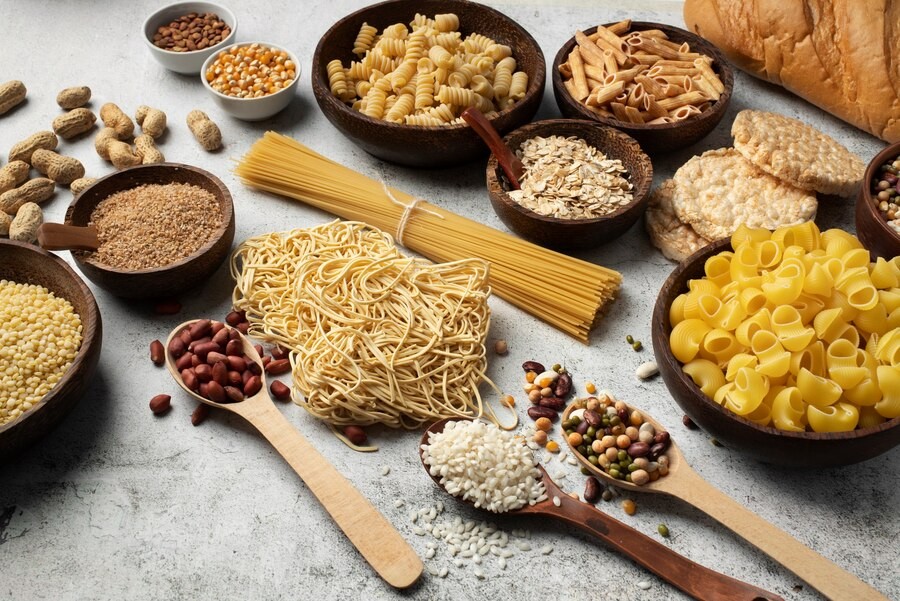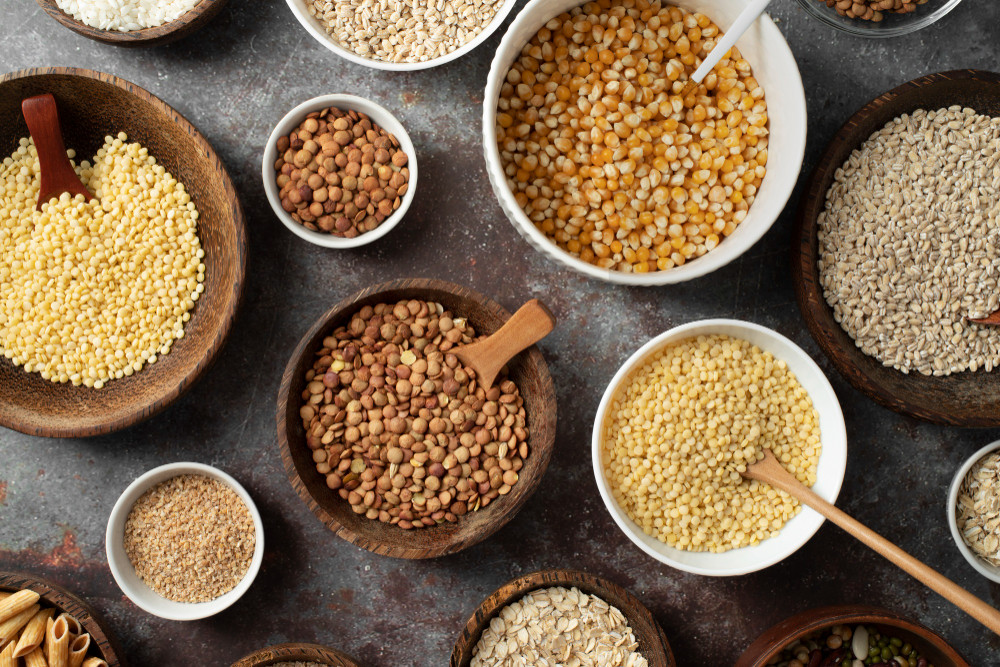Karbohidrat merupakan salah satu nutrisi penting yang memberikan energi bagi tubuh. Sebagai sumber energi utama, karbohidrat akan diubah menjadi glukosa dan digunakan sebagai bahan bakar tubuh untuk menjalankan fungsi sehari-hari. Selain sebagai sumber energi utama, otak juga mengandalkan karbohidrat sebagai bahan bakar untuk menjaga fungsi otak dan sistem saraf agar optimal.
Namun, mengonsumsi terlalu banyak karbohidrat bisa berdampak negatif pada tubuh seperti kenaikan berat badan, meningkatnya risiko diabetes, gangguan kesehatan kardiovaskular, dan kehilangan kontrol gula darah.
Manfaat Mengonsumsi Sayuran
Mengonsumsi sayuran memberikan banyak manfaat kesehatan. Sayuran kaya akan nutrisi penting, tinggi serat, menurunkan risiko penyakit, membantu mengelola berat badan, mengurangi peradangan, meningkatkan kesehatan kulit dan rambut, serta menyediakan energi tanpa meningkatkan kadar gula darah seperti makanan olahan. Beberapa sayuran juga rendah karbohidrat namun tinggi serat, sehingga ideal bagi mereka yang sedang menjalani diet rendah karbohidrat.
Jenis Sayuran yang Rendah Karbohidrat dan Kaya Serat
Serat punya banyak manfaat positif bagi tubuh seperti membantu mengatur pencernaan, mengelola gula darah, menjaga kesehatan jantung, menurunkan risiko penyakit tertentu, membantu menurunkan berat badan, dan mendukung kesehatan usus. Mengonsumsi sayuran yang tinggi serat dan rendah karbohidrat akan membantu tubuh mendapatkan manfaat serat yang optimal.
Berikut adalah beberapa jenis sayuran yang direkomendasikan:
Kembang kol
Selain serat, kembang kol kaya akan vitamin C, K, B6, folat, asam pantotenat, kalium, mangan, kolin, magnesium, dan fosfor. Kembang kol adalah sayuran populer yang dapat digunakan sebagai pengganti nasi atau pasta karena kandungan karbohidrat dan kalorinya yang rendah.
Brokoli
Selain bunga kol, brokoli juga menjadi salah satu sayuran yang kaya serat, vitamin, dan mineral. Kandungan seratnya baik membantu sistem pencernaan, sedangkan vitamin dan mineral penting di dalamnya seperti folat, kalium, dan vitamin C dapat membantu mendukung berbagai fungsi vital tubuh termasuk sistem kekebalan dan kesehatan jantung.
Baca Juga: Mengonsumsi Sayur Brokoli, Apa Saja Manfaatnya bagi Tubuh?
Asparagus
Asparagus merupakan paket nutrisi yang lengkap karena selain kaya akan serat, juga mengandung vitamin A, C, K, E, folat, dan kalium yang memberikan manfaat signifikan bagi tubuh. Vitamin A, C, dan E di dalam asparagus berperan sebagai antioksidan yang dapat melindungi sel-sel tubuh dari kerusakan akibat radikal bebas serta mendukung fungsi sistem kekebalan tubuh.
Vitamin K penting untuk pembekuan darah dan menjaga kesehatan tulang. Selama kehamilan, folat sangat penting untuk pembentukan sel darah merah dan perkembangan janin, sedangkan kalium mengatur tekanan darah dan fungsi otot.
Kubis ungu
Warna ungu dari kubis ungu menandakan adanya senyawa antioksidan yang kuat yang dapat melindungi tubuh dari kerusakan sel dan peradangan. Mengonsumsi kubis ungu juga menjadi sumber serat yang baik yang membantu menjaga pergerakan makanan dalam sistem pencernaan serta mengurangi risiko sembelit.
Serat di dalam kubis ungu menyediakan makanan untuk bakteri baik di usus serta mendukung kesehatan pencernaan secara keseluruhan. Saat kubis difermentasi, ia akan mengandung probiotik alami yang membantu mempertahankan keseimbangan mikroorganisme di dalam usus.
Baca Juga: Buah dan Sayuran yang Kulitnya Bisa Dimakan
Jamur
Jamur adalah pilihan sayur yang rendah karbohidrat dan tinggi serat. Kandungan seratnya yang sehat membantu menjaga pencernaan yang baik dan menjaga Anda merasa kenyang lebih lama. Selain itu, sifat anti-inflamasi dan antioksidannya membantu menyeimbangkan kadar gula darah, mengelola kolesterol, dan menurunkan tekanan darah.
Meskipun diet rendah karbohidrat tidak selalu cocok untuk semua orang, Anda mungkin tetap perlu mengurangi konsumsi karbohidrat. Membatasi karbohidrat membantu menurunkan risiko diabetes serta meningkatkan kesehatan secara keseluruhan. Konsultasikan dengan dokter atau ahli gizi terkait asupan karbohidrat dan nutrisi lain yang dibutuhkan agar sesuai dengan kondisi tubuh Anda.
Jika Anda memerlukan saran atau konsultasi medis, Anda dapat mengunjungi dokter atau memanfaatkan fitur konsultasi yang tersedia di aplikasi Ai Care dengan mengunduh aplikasi Ai Care dari App Store atau Play Store.
Mau tahu informasi seputar nutrisi, makanan dan tips diet lainnya? Cek di sini, ya!
- Sean Edbert Lim, MBBS
Chelsea Rae Bourgeois, RDN, LD (2023). 8 Low-Carb Vegetables That Are Also High in Fiber. Available from: https://www.health.com/low-carb-vegetables-8384887
WebMD (2022). Health Benefits of Vegetables. Available from: https://www.webmd.com/diet/health-benefits-vegetables
Kris Gunnars, BSc (2023). Why Is Fiber Good for You? The Crunchy Truth. Available from: https://www.healthline.com/nutrition/why-is-fiber-good-for-you
Sylvie Tremblay, MSc (2019). The Effects of Eating Too Many Carbs. Available from: https://www.livestrong.com/article/437002-the-effects-of-eating-too-many-carbs/
Brianna Elliott, RD (2023). The Top 8 Health Benefits of Cauliflower. Available from: https://www.healthline.com/nutrition/benefits-of-cauliflower
Megan Ware, RDN, LD (2023). The health benefits of broccoli. Available from: https://www.medicalnewstoday.com/articles/266765
WebMD (2022). Asparagus: Health Benefits, Nutrition Facts, and How to Prepare It. Available from: https://www.webmd.com/diet/health-benefits-asparagus
WebMD (2023). Health Benefits of Red Cabbage. Available from: https://www.webmd.com/diet/health-benefits-red-cabbage
Cleveland Clinic (2022). 7 Impressive Reasons To Eat Mushrooms. Available from: https://health.clevelandclinic.org/benefits-of-mushrooms











